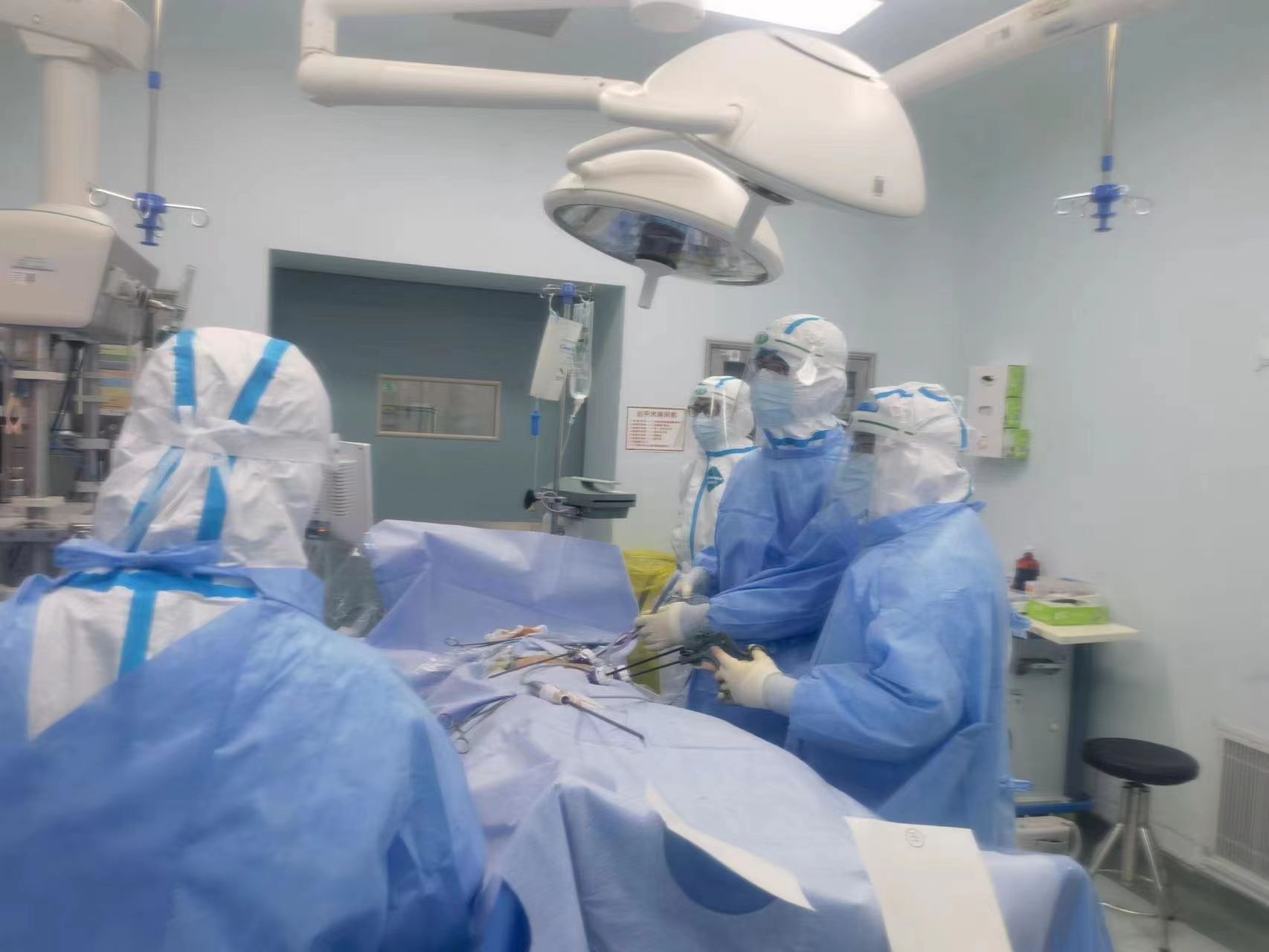
In the intensive care unit of Shanghai Tenth People’s Hospital, Mr. Li, who was lying on the bed, was still connected to a lot of monitoring equipment. But he was able to have a simple conversation with the doctors and nurses who came to the ward rounds, and recalling the thrilling moment ten days ago, he was not too embarrassed.
On April 16, Mr. Li had endured abdominal pain for three days, but the situation did not improve. Instead, it had a tendency to worsen. Finally, he was sent to the emergency room of Shanghai Tenth Hospital by “120” ambulance. General surgery emergency doctor Hu Jinghao’s physical examination found that the patient’s abdominal muscles were tense, with obvious tenderness and rebound tenderness in the middle and upper abdomen. Considering the possibility of acute abdomen, relevant tests and examinations were immediately completed. Sure enough, the CT image suggested perforation of the digestive tract.
Digestive tract perforation is one of the common acute abdomens in general surgery, with a high fatality rate and often requires emergency surgery. The earlier the treatment, the better the prognosis of the patient. Wang Jinliang, the chief resident doctor of general surgery, immediately further inquired about the medical history, and learned that the patient had a history of gastric ulcer for many years, considering that gastric perforation may be very large.
Surgery is the key to saving lives. The general surgery team took action immediately, and a race against time and life began.
Because Mr. Li is from the closed control area, Fang Lin, the director of general surgery, took the lead personally, and continued to improve the preoperative examination and nucleic acid for patients according to the work flow and infection control requirements of the medical department and the hospital infection office. During the inspection, he coordinated with the director of the Department of Anesthesiology, Zhao Xuan, the head nurse Chen Jingjuan of the operating room nursing team, and Wang Sheng, the director of the Department of Critical Care Medicine, to arrange the patient’s surgery and postoperative care.
Because the relevant emergency plans are complete and the procedures are clear, all the work is progressing in an orderly manner and the staff of the relevant departments fully cooperate, without delaying the precious time for rescue. After everything is ready, the patient is immediately sent to the negative pressure operating room .
Dr. Wang Feng and Dr. Wang Jinliang, dressed in thick white, face screens and N95 masks, started a life-saving operation. Due to the prolonged delay in the course of Mr. Li’s disease, it was found during the operation that the abdominal cavity was seriously polluted, with a large amount of pus inside, and the surrounding tissue was covered with pus coating. Sexual shock, but fortunately, the escort of the anesthesiologist kept the patient’s vital signs stable during the operation.
As preoperatively estimated, a 0.8cm perforation was found in the patient’s gastric antrum, and perforation repair was performed. After the operation was completed, everyone took off Dabai, and everyone found that the hand-washing clothes were already soaked with sweat, but the hearts that had been hanging were relaxed. After the operation, the baton of the patient’s life was passed to the colleagues in the intensive care department. Thanks to their efforts, Mr. Li is gradually recovering.
Recently, there are several emergency surgeries related to digestive tract perforation carried out by the General Department of Shanghai Tenth Hospital Perforation; Uncle Xu, 67, suffered from abdominal pain and distension for three days. When he came to the emergency room, he found that the jujube pit accidentally swallowed a month ago had caused multiple perforations in the ileum. Grandma Cao, 78, suffered from abdominal pain for three days. Sinus perforation.
Compared with 41-year-old Mr. Li, due to his advanced age and underlying diseases such as hypertension, the rescue of these elderly people is more difficult. The process depends on the tacit cooperation between multiple departments. The emergency negative pressure operating room is announced again and again that the operation was successful, and the patient is gradually recovering in the intensive care unit.
During a special period, the disease must not be delayed because of the epidemic. With such determination, the medical staff of the General Surgery Department of Shanghai Tenth Hospital did not dare to slack off for a moment. It is understood that the doctors and nurses of the general surgery emergency department and emergency abdominal pain center have been working 24 hours a day, with an average of about 120 patients per day. Endoscopic appendectomy and emergency management of choledocholithiasis, cholangitis, etc.
Author: Li Chenyan Yang Jing
Editor: Li Chenyan
Editor in charge: Jiang Peng
*Wenhui’s exclusive manuscript, please note for reprinting Clear source.